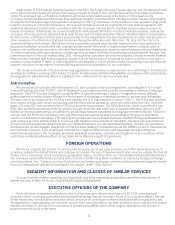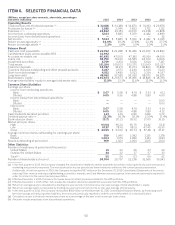American Express 2015 Annual Report Download - page 51
Download and view the complete annual report
Please find page 51 of the 2015 American Express annual report below. You can navigate through the pages in the report by either clicking on the pages listed below, or by using the keyword search tool below to find specific information within the annual report.
Legal, Regulatory and Compliance Risks
Ongoing legal proceedings regarding provisions in our merchant contracts could have a material adverse effect
on our business, result in additional litigation and/or arbitrations, subject us to substantial monetary damages
and damage our reputation and brand.
The DOJ and certain states’ attorneys general brought an action against us alleging that the provisions in our card
acceptance agreements with merchants that prohibit merchants from discriminating against our card products at the
point of sale violate the U.S. antitrust laws. Visa and MasterCard, which were also defendants in the DOJ and state
action, entered into a settlement agreement and have been dismissed as parties pursuant to that agreement, which
was approved by the court. The settlement enjoins Visa and MasterCard from entering into contracts that prohibit
merchants from engaging in various actions to steer cardholders to other card products or payment forms at the point
of sale. On February 19, 2015, the trial court found that the challenged provisions in American Express card
acceptance agreements were anticompetitive and on April 30, 2015 issued a final judgment prohibiting us from
enforcing certain elements of such provisions. We appealed this judgment and on December 18, 2015, the Court of
Appeals for the Second Circuit stayed the trial court’s judgment pending the issuance of its appellate decision. We are
also a defendant in a number of actions and arbitration proceedings, including proposed class actions, filed by
merchants that challenge the non-discrimination and honor-all-cards provisions in our card acceptance agreements
and seek damages. A description of these legal proceedings is contained in “Legal Proceedings.”
An adverse outcome in these proceedings against us (including an adverse final judgment following appeal in the
DOJ and state action) could have a material adverse effect on our business and results of operations, require us to
change our merchant agreements in a way that could expose our cards to increased merchant steering and other
forms of discrimination that could impair the Card Member experience, result in additional litigation and/or
arbitrations, impose substantial monetary damages and damage our reputation and brand. Even if we were not
required to change our merchant agreements, changes in Visa’s and MasterCard’s policies or practices as a result of
legal proceedings, lawsuit settlements or regulatory actions could result in changes to our business practices and
materially and adversely impact our profitability.
Our business is subject to significant and extensive government regulation and supervision, which could
adversely affect our results of operations and financial condition.
We are subject to extensive government regulation and supervision in jurisdictions around the world. The current
environment of additional regulation, enhanced supervision efforts and increased and unpredictable regulatory
investigations and enforcement is likely to continue to result in changes to our business practices, products and
procedures, increased costs (including increased compliance costs), and potentially additional penalties and/or
restitution payments to Card Members. In addition, new laws or regulations or changes in the enforcement of existing
laws or regulations applicable to our businesses could impact the profitability of our business activities, limit our ability
to pursue business opportunities or adopt new technologies, require us to change certain of our business practices or
alter our relationships with partners, merchants and Card Members, or affect retention of our key personnel. Such
changes also may require us to invest significant management attention and resources to make any necessary
changes and could adversely affect our results of operations and financial condition.
If we fail to satisfy regulatory requirements to maintain our financial holding company status, our financial
condition and results of operations could be adversely affected, and we may be restricted in our ability to take certain
capital actions (such as declaring dividends or repurchasing outstanding shares) or engage in certain activities or
acquisitions. Additionally, our banking regulators have wide discretion in the examination and the enforcement of
applicable banking statutes and regulations and may restrict our ability to engage in certain activities or acquisitions or
require us to maintain more capital.
In recent years, legislators and regulators have focused on the operation of card networks, including interchange
fees paid to card issuers in payment networks such as Visa and MasterCard and the fees merchants are charged to
accept cards. Fee regulation can significantly negatively impact the discount revenue derived from our business,
including as a result of downward pressure on our discount rate from decreases in competitor pricing in connection
with caps on interchange fees. In some cases, such regulation extends to certain aspects of our business, for example,
GNS or cobrand arrangements or terms of card acceptance for merchants, including terms relating to non-
discrimination and honor-all-cards. We have brought a legal challenge and seek a ruling from the EU Court of Justice to
invalidate the application of price caps in circumstances where three-party networks issue cards with a cobrand
partner. There can be no assurance that our legal challenge will be successful. For a description of certain regulations
and their impact on us, see “Global Network & Merchant Services — Regulation.” Legislators and regulators around
the world are aware of each other’s approaches to the regulation of the payments industry. Consequently, a
development in one country, state or region may influence regulatory approaches in another.
We are subject to certain provisions of the Bank Secrecy Act, as amended by the Patriot Act, with regard to
maintaining effective AML programs. Increased regulatory focus in this area could result in additional obligations or
restrictions with respect to the types of products and services we may offer to consumers, the countries in which our
cards may be used, and the types of customers and merchants who can obtain or accept our cards. Activity such as
money laundering or terrorist financing involving our cards could result in enforcement action, and our reputation may
40
























